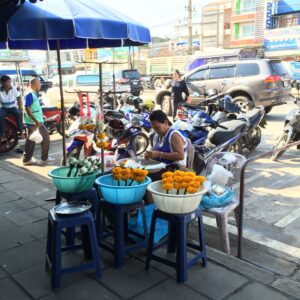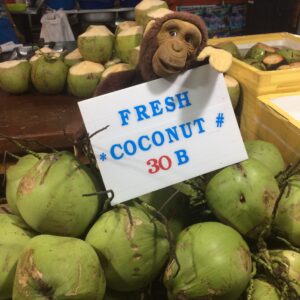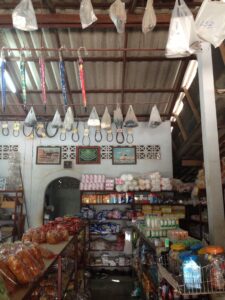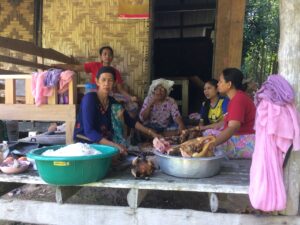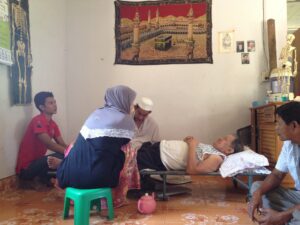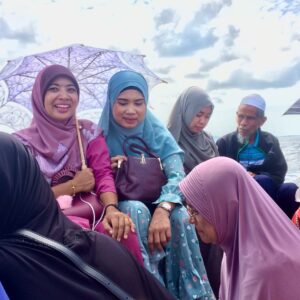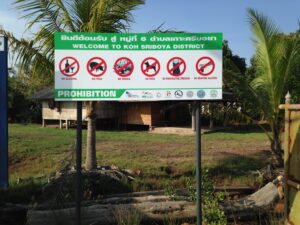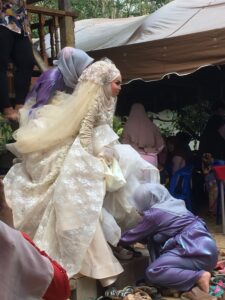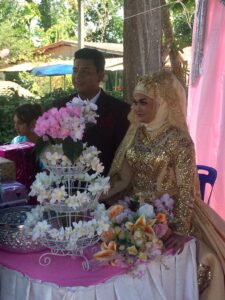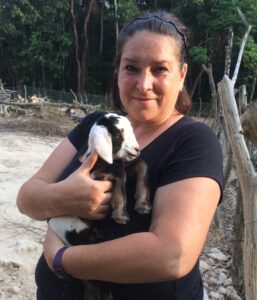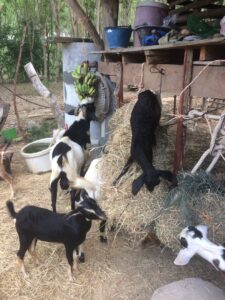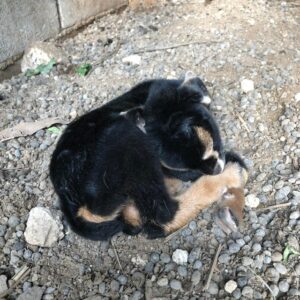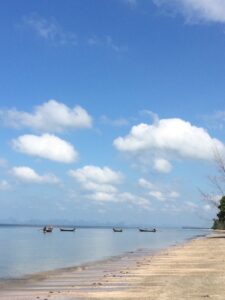The Hidden Face of Thailand
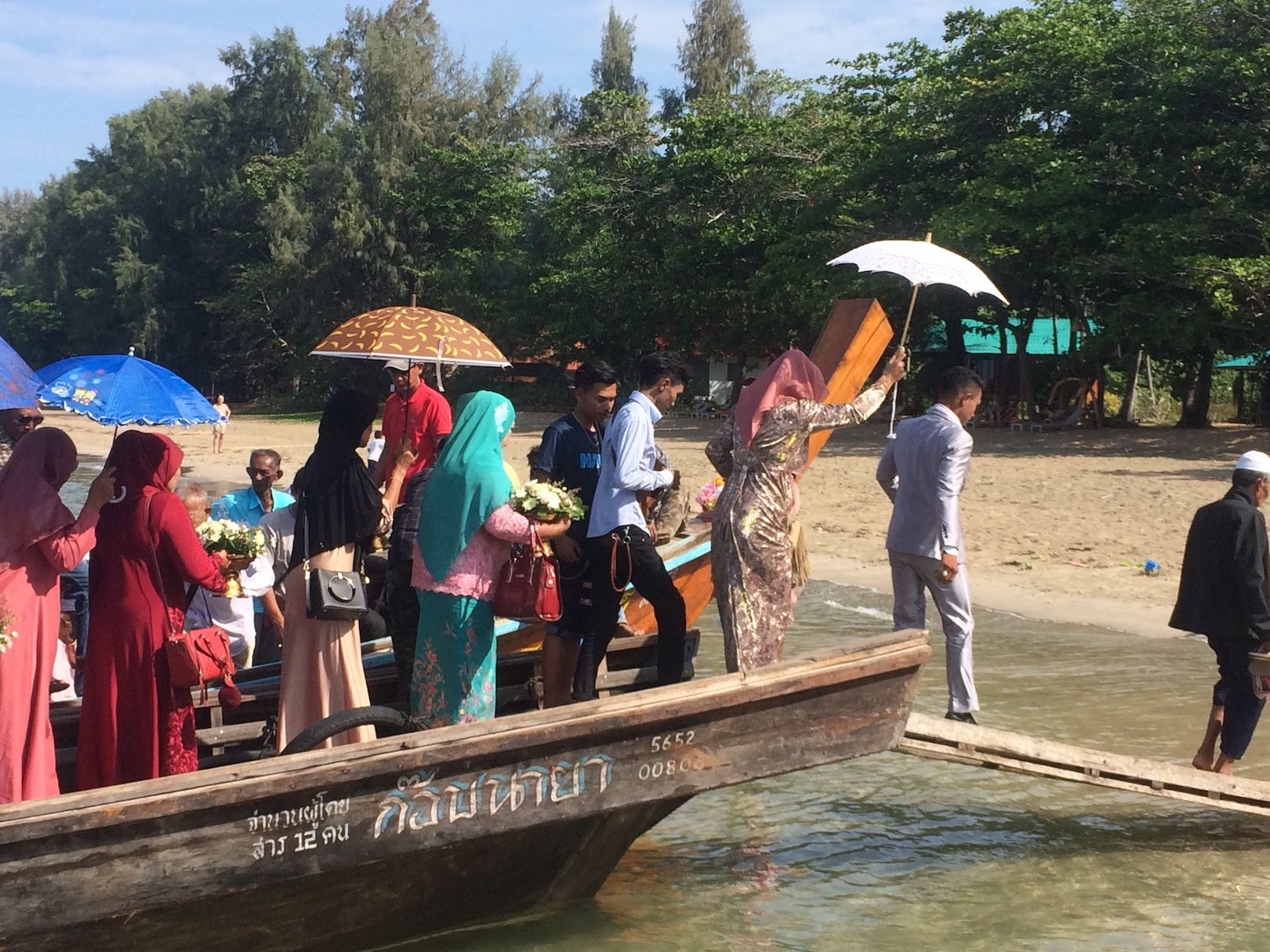
In part 2 of her story Melanie Rüdiger, a German architect who is married to a Thai, reports on her life in a Muslim village community with sometimes challenging differences in culture and mentality.
What infrastructure is there on „your“ island?
Koh Siboya is almost exclusively inhabited by Muslims, and apart from a few shops for their daily needs, no kind of culture is offered here. For any major purchases, cash withdrawal, mail services or a doctor’s visit, even in acute cases, we must always go to the mainland, regardless of weather conditions and waves. Since we do not own a car, we do all this by motorcycle. A life without a car in Munich would be unthinkable for me. Here, however, I try to avoid all purchases that require immense care in order to function in the tropical climate on the long run. What I miss less are visits to museums and cinemas. Rather the coffee or the drink afterwards. All of this I just block out mentally and make up for it on home visits.
You had to convert to the Muslim faith…
The biggest step into my other life was becoming a member of the Islamic community. I avoid the term “converted” because, in my opinion, this includes more than a brief ceremony and how I actually live. Islam is on the one hand formative for living together in the village communities, on the other hand it combines with the tolerant attitude of the Thais, for whom a peaceful coexistence of all religions in the whole country is a matter of course. Nevertheless, it is assumed to move in together under one roof only as a married couple and to convert to Islam as a spouse. Apart from covering my hair in public and not showing too much bare skin, nothing else is expected of me. It is probably obvious to everyone that I did not become a Muslim overnight. However, I never leave the house without a hijab, the head veil, which in Thailand is mostly colourful and comes with a lot of bling-bling. Bare shoulders and bare knees in light fluttering dresses are a no-go. This is sometimes a challenge in the tropical climate, but in return I am unconditionally accepted in the community. Of course, this is a huge difference to the free life as a tourist.
How do you cope with the differences in mentality?
The tourism industry has coined the term “Land of Smiles”. In fact, Thais often hide their true thoughts and feelings behind their smiles. Over time, I have learned to read behind the smile, but I suspect I will never understand my husband one hundred percent. When I try to follow up, I often get the answer “don’t think so much”. It’s almost impossible to argue or discuss with Low, because he has no interest in that. He’d rather agree with me. In our Western culture, we are trained to represent our opinion and to express it emphatically. Standing up for oneself and asserting oneself is seen as a sign of strength. The Thais, however, will react on people who get upset or complain with an inner shake of the head and an embarrassed smile. After all, such a behaviour means losing face. In-depth conversations or “serious” movies, those with storylines that are not just made up of action or aliens, don’t fall into the taste anyway. Thais want to have fun and be able to laugh.
Were you accepted by the local women from the beginning?
To be honest, at first I had the most respect for my father-in-law. Would he welcome me into the family as a non-Muslim, or would he simply ignore me, as I experience with many local men? However, he proved to be very affable and welcomed me, like the rest of the extended family, with open arms. That would certainly be different if I did not conform to the dress code or walked the street without wearing a hijab. Amazingly, the older people in particular have accepted and respected me as a stranger and non-Muslim right from the start, while I have made few contacts with women of the same age or younger. Here I encounter – and so does Low since our marriage – partly envy and prejudices, because in their eyes we are “rich”. However, conversations that go beyond food and daily routines do not take place anyway. On the one hand, there is the language barrier – my Thai is just enough for ordinary topics and hardly anyone speaks English -, on the other hand, there is simply no common ground. I need to get that intellectual exchange back home over the phone.
You and your husband run a breeding of „sacred animals”…
I don’t know if the goats can be called sacred because, unlike the holy cows of the Hindus, they are eaten. In any case, in Islam they are considered special animals that are used as an offering in curries during certain festivities. For a full-grown male goat, almost 10,000 baht are paid, which is roughly the monthly salary of a worker. Of course, I would prefer someone to buy an animal for breeding, but this is hardly ever the case. We don’t sell our goats until they are eight to ten months old at the earliest, when they weigh around 20 kg. Due to the extreme weather conditions in the tropics, it is not always easy to fill the picky goats’ bellies. In the hot, dry season there is too little food, in the rainy season it is often too wet for grazing. All year round we make fire under the goat barn every evening, against moisture and mosquitoes.
What is positive about life in the tropics?
The positive side is clearly all that, which is why millions of tourists visit the tropics every year. The warm climate and, if you happen to live on the coast, the sea in front of you. In southern Thailand there are only two seasons – “hot season” and “rainy season” – with the temperature practically never falling below 25 degrees Celsius. The vegetation is lush throughout the year, you can almost watch the plants grow. But of course this is only one side of the coin. Not surprisingly, what you experience as a tourist is not always consistent with ordinary life.
…and what is negative?
Most of the time I am asked first if there are dangerous snakes and spiders in Thailand. On our island, there are four highly venomous species of snakes all of which I have seen myself. In everyday life, they are not a threat at all. It’s rather the little creatures and insects that make one‘s life hard. The spectrum ranges from gecko eggs in the toaster to sand lump wasp nests in the clothes to flip-flop-dissecting ants. The cute geckos, which probably populate almost every house in Thailand, poo in every room all day long. That’s why I can’t enjoy gorgeous fabrics or decorative objects. Most materials except plastic and porcelain cannot stand the humid climate and the salty air anyway. Clothing gets mildew stains quickly, and mouldy pillows are normal in the rainy season. Everything feels moist and smells within a very short time, as it does not dry properly for weeks. On holiday, you can take a lot of it, find it wildly romantic and belonging to the local colour. As a tourist you can console yourself with the fact that the grunge does not last forever and that you will put all smelly clothes in the washing machine at home. For me, this is not an option.
What is the most important thing your new life has taught you?
I’ve gotten into the habit of thinking twice before buying most things and asking myself “is it really important, do I really need this? ” – considering as well that many things are simply no longer presentable or usable within a very short time. And as banal as it sounds, the only things that seem important to me now are access to clean water and our health. Right in my first year in Thailand, the fresh water in the reservoir that supplies our village was used up and the rainy season took a long time in coming. For six weeks we were without water from the tap. Low fetched water by motorcycle every day, as he wanted to save me the trouble of washing right there at the well, as the other women did, wrapped in their sarongs. The following season we invested in a big tank.
What are you missing most?
I miss the continental climate in Europe, the seasons, the Bavarian mountains and lakes. Although I live in the Indian Ocean, I miss the Mediterranean Sea, the Mediterranean lifestyle. I also miss our cultural diversity, the natural exchange with neighbouring European countries. Since the Asian countries are a group of nation states, there is not much mixing here. The languages of the neighbouring countries are not even remotely understood among each other. Of course, I am always happy to come back to Germany, where I am “one out of many”, because in Thailand I will always remain the “farang”, the foreigner.
If you could decide again, would you choose to live in Thailand again?
My decision to move to Thailand was primarily a decision in favour to live with my husband. Of course, I was also tempted to experience a completely different life abroad. I had previously lived in Italy and Norway for a long time, but never in a foreign culture. But, to be honest, life is more arduous in every respect, and that’s not just because of the lack of household appliances or the like. If we were both free to live wherever we want – because we are not due to visa regulations that apply even for married couples – I would rather split the time in half. We both appreciate the positive aspects of our home countries. In addition, the Covid-19 pandemic has shown how far apart the two countries are from each other in reality, and that the way back can quickly be denied us.
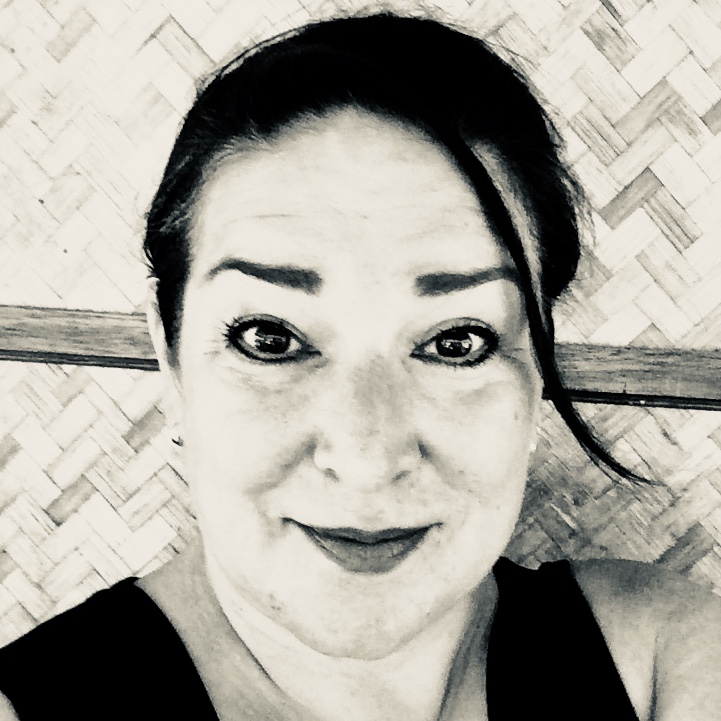
Since I swapped the urban jungle for a real one in 2014, I have been living in two worlds. As a graduate engineer in architecture in Germany, I deal with large-scale projects built of concrete and steel. I am passionate about Scandinavian architecture and timeless design. On our goat farm in Thailand there is nothing more exciting than the birth of a new kid. Besides that, I always find something to redesign and to learn new craft techniques. I am learning new languages with enthusiasm, with Thai being the biggest challenge so far.
